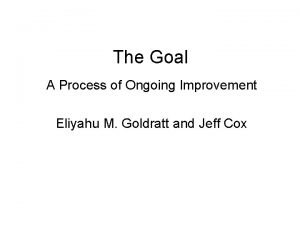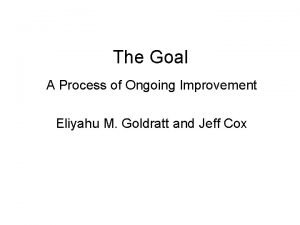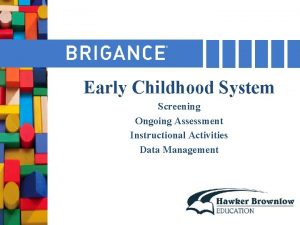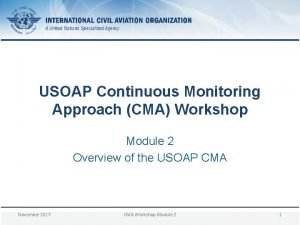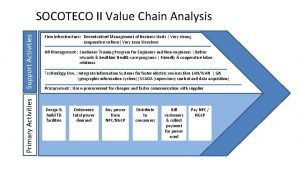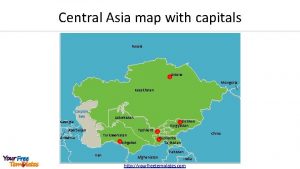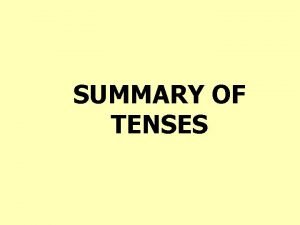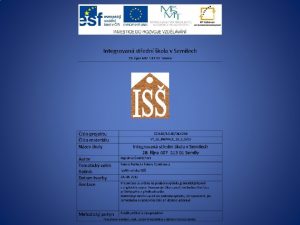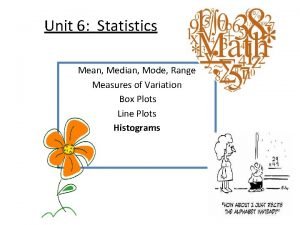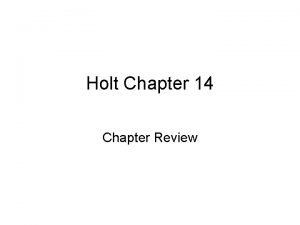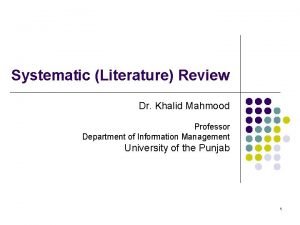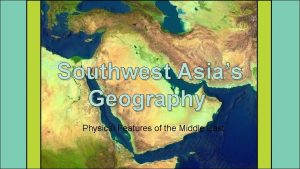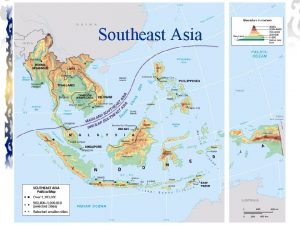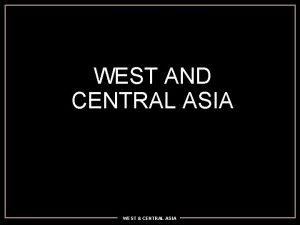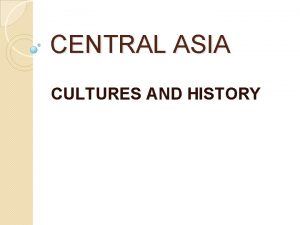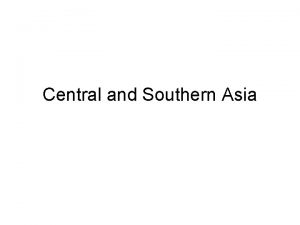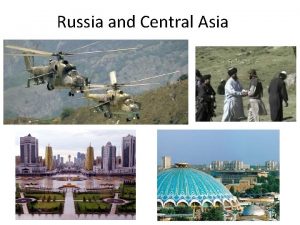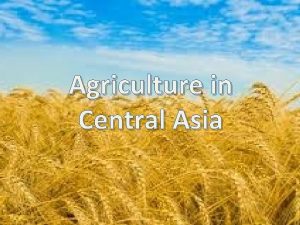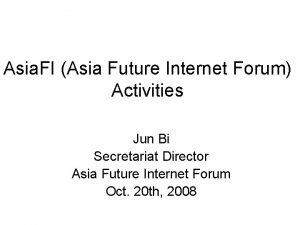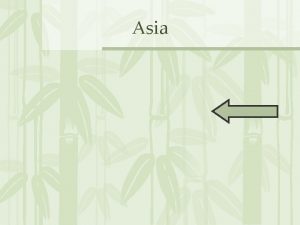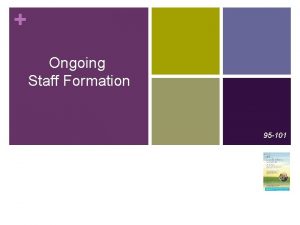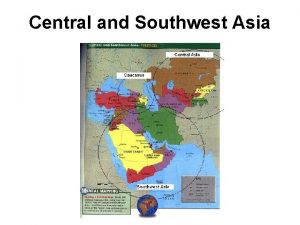Central Asia Review of ongoing activities and future












































- Slides: 44

Central Asia Review of ongoing activities and future prospects Jozef Turok and Team Head, CGIAR Program Facilitation Unit for Central Asia and the Caucasus (CAC) ICARDA Regional Coordinator CRP-DS Science and Implementation Workshop 30 th June – 4 th July, 2014 Holiday Inn Hotel - Amman, Jordan 1

Outline of presentation 1) Background – existing partnership in the Region and rationale for an integrated dryland systems research agenda in Central Asia 2) Inception and implementation – from research hypotheses to Activities with Outputs, Outcomes, IDOs, Impact 3) Highlights of progress in Action Sites 4) Selection of Representative Research Areas in Action Sites 5) Governance/ management aspects 6) Perspectives

Existing partnership: Regional Program for Sustainable Agricultural Development in CAC Operational since 1998 Eleven CGIAR and non-CGIAR Centers Strong partnership with national agricultural research systems Each Center has own mandate and expertise – transfer, testing and development of technologies • Governance by Steering Committee • Program Facilitation Unit in Tashkent provides policy, technical and administrative support • Portfolio of about 70 projects since 1998 • Strengthening local institutions, training • 130 training courses with more than 2500 participants • • www. cac-program. org

CGIAR Research Programs in CAC • Research problems are inter-related • Interdisciplinary approaches combined with site-specific implementation plans • Exploit synergies among Centers, avoid redundancy, contradictions and competition • Increased stakeholder participation for improving acceptability of research results • Inclusion of gender, youth issues • Co-location of Centers and common procedures, resources in Tashkent have offered opportunities for CRPs implementation in Central Asia • Dryland Systems • • Policies, Institutions and Markets Wheat Roots and Tubers Dryland Cereals Water, Land Ecosystems Forests, Trees and Agroforestry Climate Change Genetic Resources

DS CRP Flagship: Central Asia

Sustainable intensification -- Fergana Valley including Batken, Jalalabad, Osh provinces (Kyrgyzstan), Sugd region (Tajikistan), Andijan, Namangan, Fergana provinces (Uzbekistan) Key characteristics: Water for irrigation, options for diversified production systems for cotton-wheat-livestock-vegetables and horticultural crops, characterized by high and unique agrobiodiversity, along with good research and transport infrastructure are some of the factors that can lead to higher standards of living of the local population

Central Asia: Population in Action Sites Action Site Fergana Valley Rasht and Kyzyl Suu Valley Aral Sea Region Population, 000’ % of rural population 12 957. 4 50. 2 286. 9 97 5 238. 2 55. 3

Inception phase 2011 -2013 • Regional Implementation Workshop in August 2013 • Integrated Research Team with inputs from Centers’ Programs • Detailed characterization of Action Sites in English and in Russian available on internet • Finalized Logframe, discussed and agreed on a set of 21 Activities • Partners and their key contributions along the researchfor-development continuum • New funding: CGIAR/ICARDA contribution of Russian Federation fully aligned with DS CRP in Central Asia

risks, constrains bottlenecks Salinity, waterlogging, irrigation water deficit, soil degradation, drought, heat, frost tolerance of crops, low productivity, landslides, soil erosion, out -of-date or lacking storage and processing infrastructures, inefficient seed systems, low research education and extension capacity in agriculture, lack of small-scale innovations, etc.

Total Samarqand Tashkent Andijan Namangan • Abandonment of degraded lands: every year 30, 000 ha (Land Reclamation Fund, 2013), i. e. about 0. 7% of irrigated area; Surkhandarya Kashkadarya Fergana Navoi Karakalpakstan 10 Djizakh Bukhara (State Land Cadaster Committee, 2013) Syrdarya Khorezm 0. 0% 20. 0% 40. 0% 60. 0% 80. 0% 100. 0%

Mapping of constraints across Action Sites Problems, constraints Salinity Waterlogging Irrigation water deficit Soil degradation Low drought, heat, frost tolerance of varieties Fergana Valley Moderate Low productivity of local varieties Low productivity – crops Moderate Low productivity – liivestock Landslides Soil erosion Out-of-date or lacking storage and processing infrastructures Moderate Rasht Valley Fragmented Severe Seasonal Severe Low productivity of local varieties Marginalized agriculture In Marginal lands Typical Severe Out-of-date or absence technologies Across value chain Undeveloped Absence Need to be improved Need to be outscaled Very low Throughout Inefficient seed systems Low capacity Lack of small-scale innovations Action site Aral Sea Region Severe In Khorezm province Severe Low productivity of local varieties Due to soil degradation In Marginal lands Severe Moderate Severe

production/livelihood systems Cereals – winter wheat, barley, rice; grain legumes, vegetables, potato; cotton; agroforestry; horticulture; pastures; livestock; fodder crops; poultry; aquaculture, bee-keeping… (1) Agro-pastoral (2) Irrigated crop system (3) Tree-based (4) Homegardens

research hypotheses Fourteen hypotheses articulated…. • Improved options and practices for integrated water and land resources management, increased diversity portfolio (including neglected and underutilized species) adapted to soil salinity in target cotton-wheat-ricelivestock production system will increase soil and environmental health, sustainable agricultural productivity, improve diets and food nutrition, and increase employment in the Aral Sea Region ……

innovations and deliverables… developed through integrated, participatory research methods, tools, processes, technology, research, testing, adoption, options

cross-cutting issues Gender, youth, biodiversity, smallholders, nutrition, capacity building


Hierarchy of DS CRP objectives in Central Asia SLOs at DS CRP level Strategic IDOS 1. 2. 3. 4. Reducing rural poverty Increasing food security Improving human nutrition and health Sustainable management of natural resources Resilient livelihoods (IDO 1) Reducing vulnerability and managing risk through increased resilience Well-being (IDO 2) Sustainable intensification for more productive, profitable and diversified systems IDO 3 Food Access - Women and children in households have better access to greater quantity and diversity of food IDO 4 NRM - More sustainable and equitable management of land, water resources, energy and biodiversity IDO 6 Capacity to innovate - to use new opportunities and meet challenges to improve livelihoods Gender Empowerment (IDO 5) Women and youth have better access to and control over productive assets, inputs, information, market opportunities and capture a more equitable share of increased income, food and other benefits

Outreaching DS CRP in Central Asia Impact 1, 000 s Intermediate Development Outcomes 100, 000 s Multidisciplinary research outputs 10, 000 s IRT Products 1000 s inhabitants 1. 2. 3. 4. Reducing rural poverty Increasing food security Improving human nutrition and health Sustainable management of natural resources Development collaboration to bring innovatios to scale: Multidisciplinary platform in cooperation with public sectors, CSOs, Development agencies are out-scaling innovations and creates a multistakeholder platform for sustainable development practices leading to improving the wellbeing in the region. Multidisciplinary, community based partnership: Interdisciplinary Research Network in close collaboration with NGOs, Local partners, local governments, private sectors are testing and adopting innovations, technology, methods, tools, processes, approaches Interdisciplinary, participatory research: technologies / innovations; management; models; techniques; past and present developments

Central Asia: Activities in 2014 -- 2015 1. Productivity of marginal lands 2. Livestock productivity 3. Water use efficiency 4. On-farm adaptive trials/ varieties 5. Seed systems 6. Strategic Innovation Platform 7. Knowledge management CACILM 8. Geoinformatics capacities

Mapping Phased Activities across ALSs 2014 Tr Ir Ongoing cluster activities 1 2 3 4 5 6 Marginal lands Livestock productivity Water use efficiency Varieties Seed systems Innovation Platform Knowledge Management 7 CACILM 8 Geoinformatics capacities Discovery phase Proof of concept phase Pilot phase Scaling up phase Ag Agro-pastoral systems Tr Tree-based systems Ir Irrigated crop systems Ag Hm Ag 2015 Tr Ir Hm Ag 2016 Tr Ir Hm

Contribution of Activities to IDOs IDO 1 IDO 2 IDO 3 IDO 4 IDO 5 IDO 6 Cluster actitities Ag 1 Marginal lands Livestock 2 productivity Water use 3 efficiency 4 Varieties 5 Seed systems 6 Innovation Platform 7 CACILM 8 Geoinformatics IDO 1 Reslience IDO 2 Wellbeing IDO 4 - NRM IDO 6 -Capacity IDO 5 -Gender IDO 3 -Food Tr Ir Hm Ag 40% 20% 10% 30% 20% 30% 40% 10% 20% Ir Hm Ag 10% 10% 20% Tr 20% Tr Ir Hm Ag 20% 30% 20% Ir Hm Ag 10% 10% 30% 10% 20% Tr 10% Tr Ir Hm 10% 10% 10% 40% 40% 20% 30% 20% 20% 20% 10% 10% 10% 20% 20% 20% 30% 20% 10% 20% 30% 40% 30% 20% 10% 40% 30% 30% 30% 20% 20% 20% 10% 10% 10% 30% 30% 20% 20% 40% 10% 10% 30% 30% 40%

Marginal lands Objective: • Improve agricultural production under saline conditions with minimum trade-offs within the Aral Sea Basin, applying a farming systems approach Outputs in 2014: • Inventory and classification of production systems and marginal lands associated with different natural resources management scenarios -- one dataset for the Basin • Networking with national research partners and policy makers to develop a basis for institutional support for long-term salinity management • Field-based management strategies within the broader regional salinity management approach, in cooperation with CRP WLE • Gender aggregated labor distribution and decision making processes for communities Progress: • Mapping marginal lands in Khorezm province, Uzbekistan (Aral Sea Site) in collaboration with KRASS, April 2014

Marginal lands Mapping marginal lands prone to soil degradation in Khorezm province, Uzbekistan (Aral Sea Site): soil salinization map (EC, d. S/m) -- from technical report KRASS, April 2014

Livestock productivity Objective: • Increase livestock productivity for better availability of animal proteins to the households and increased revenues and well-being of the pastoralists Outputs in 2014: • Analysis of sheep and goat production systems in two communities in each Action Site (Rasht Valley and Aral Sea Region) • Qualitative value chain analysis from production through to consumption in two Action Sites representing 400 small ruminant keeping households • Set of interventions identified and prioritized Progress: • Workshop with key national partner institutes and other Activity leaders; field visits in Rasht Valley, discussions with livestock farmers – May 2014 • Focus on agro-pastoral systems considering linkages to mixed systems, fodder production opportunities • Set of interventions discussed, identified • Field research coordinator recruited • Linkages with World Bank regional project on animal health

On-farm adaptive trials Objective: • Identify multiple new varieties with better and reliable yields that reach more farmers who cultivate in the prevalent crop-livestock systems to improve the competitiveness of crops within farming systems by enabling labor-saving technologies to reduce weeding and harvesting costs Outputs in 2014: • 200 advanced lines of wheat, barley, chickpea, mungbean, tomato and potato evaluated by the farmers • One training course organized on planning, management and evaluation of field experiments; and one on application of statistical software in data analysis, presentation and interpretation of the results • Three farmer field days Progress: • Field demonstration plots • Out-scaling: one improved variety of chickpea planted on 11 ha involving 8 farmers in Namangan, Uzbekistan to demonstrate varietal performance and multiply seed for out-scaling in 2014 -2015 season

On-farm adaptive trials (continued) • Two commercial varieties were selected by the farmers and will be entered in official seed multiplication plan for 2014 -2015 in Karakalpakstan and Khorezm regions of Uzbekistan. These varieties were previously not recommended for cultivation in the Aral Sea Action Site in Uzbekistan. • One commercial and three perspective winter wheat varieties were selected by the farmers in Fergana Valley in Uzbekistan to be included in the official seed multiplication plan for 2014 -2015. Previously, these varieties were not cultivated in the Fergana Valley Action Site in Uzbekistan. • Five new candidate cultivars of winter wheat were identified in field evaluation and will be tested for quality parameters. One cultivar is likely to be submitted to State Variety Testing for further testing and release in Aral Sea Region. • Two frost tolerant winter wheat varieties were selected by the farmers in the Sugd province of Tajikistan. Farmers’ field demonstration and seed multiplication of these two varieties will be done in 2014 -2015.

On-farm adaptive trials Frost tolerant Frost susceptible Frost tolerant Evaluation of frost tolerance in winter wheat on medium saline field near Urgench, Uzbekistan, Aral Sea Site – early March after frost in February 2014

Frost tolerant Frost susceptible tolerant susceptible Frost tolerant Evaluation for frost tolerance in winter wheat (Nukus, Uzbekistan, Aral Sea Site) -- in mid April after frost in February 2014

Farmers’ Field Days in spring 2014 Karakalpakstan, Uzbekistan 27 May 2014 Khorezm, Uzbekistan 28 May 2014 Fergana, Uzbekistan 31 May 2014 Sugd, Tajikistan 11 June 2014 (Photos by Ram Sharma, 2014)

Legumes for diversification, soil fertility improvement and increased income Harvest wheat in June Wheat seed sowing in October Growing of early maturing mungbean in June-September (with 1 -2 irrigations) (Photos by Ravza Mavlyanova)

Water Use Efficiency Objectives: • Determine water and energy productivity of dryland production systems with high level of vulnerability and with greater potential for more productive, profitable and diversified dryland agriculture • Introduce innovative technologies in irrigation and cultivation of cereals, potatoes, vegetables, fruits and forage crops in Fergana Valley through (collaboration with SIC-ICWC) Analysis of existing constraints hindering the efficient water use based on an assessment of the results of previous projects; Organize an effective system of water management at the field level in WUAs; Organize demonstration plots in selected pilot WUAs; Transfer available knowledge and technologies; training. Progress: • Review and preparation of a set of existing approaches and technologies on the basis of previous projects in selected pilot WUAs in the Fergana Valley : Developed mechanisms for effective planning and water allocation; Selected pilot farms and demonstration plots on which innovative technologies are practiced.

Water Use Efficiency • Selecting and organizing demonstration fields in the Fergana province (Fergana Valley Site, Uzbekistan) -- farmer’s household “Kahramon Davlat Sahovaty” located on the territory of the Quva district of the Water Users Association “Kodirjon Azamjon” (winter wheat area 1 ha and cotton 19 ha)

Four measuring stations were built to measure water supply and discharge of residues of irrigation water from the irrigated fields. These gauging stations are located at the inlet and outlet of the field allocated for cotton crops and winter wheat -- from technical report SIC-ICWC, April 2014 (Photo Shukhrat Mukhamedjanov, 2014)

Water Use Efficiency in Fergana: • Water and Energy Use Efficiency through Innovative Irrigation Approaches; • Linked to an ongoing bilateral project on Improved potato varieties and water management WUA K. Umarov technologies; in Fergana Province, • Water governance and Uzbekistan where its impact on efficient activities are use of water; interlinked • Gender in Water Users Associations (WUAs).

Central Asian Countries Initiative for Land Management (CACILM) – Knowledge Management in Phase II

Project objectives Enhance the CACILM knowledge management component for facilitating widespread dissemination of Sustainable Land Management approaches and technologies; Improve agricultural systems for enhanced productivity and sustainability, and promote climate change adaptation approaches and technologies. • Multidisciplinary approach to disseminate SLM at different levels for enhanced productivity and climate change adaptation through synthesis, socio-economic assessment and packaging and dissemination

Collected Sustainable Land Management approaches and technologies to date Countries Approaches Technologies TOTAL Kazakhstan 1 34 35 Kyrgyzstan 9 25 34 Tajikistan 5 31 36 Turkmenistan 0 20 20 Uzbekistan 14 40 54

Conservation Agriculture • First conservation tillage practices in Kazakhstan in the 1960 s • Now more than 1, 900, 000 ha under conservation agriculture mostly in rainfed North Kazakhstan • Recognized in state policy with subsidies • Research and demonstration efforts in irrigated areas in Kazakhstan, Azerbaijan, Uzbekistan • ‘Crop-Livestock Conservation Agriculture’ -- Tajikistan Wheat yield response to planting method, two different farms in Azerbaijan (2011) Planting method Wheat grain yield, t/ha Saved water, % Jumshudov Babaev Bed planted 5. 37 4. 53 36% Broadcasted 3. 52 3. 25 (A. Nurbekov et al. , ICARDA, 2014) Residue retention

Equipment procurement: plot thresher 5 units, EM Meter for field salinity measurement, maintenance of Eddy Flux Tower, laser leveling equipment etc…

Innovation Platform and up-scaling Action site level Development agencies Ministries Province Government Universities Local communities NGOs Local service providers Province / District level Rural Advisory Services Community level Representative Research Area IRT CSOs Private sector National research Local governments Farmers, Growers, Unions

Selection criteria for Representative Research Areas within Action Sites • High potential to demonstrate impact for the small farmer • Ideally a mixed farming system, i. e. different crops, livestock; diversity in economic status of small farmers, age and ethnic groups, man/woman headed households, different sources of income; varied production constraints/ opportunities • Geographically located in an Action Site and represents its characteristics • Access to support institutions – national research and extension services • Availability of previous data/ baseline survey is an advantage • A cluster of farms (village), a large farm, a cooperative or Water Users Association

Representative Research Areas: Fergana Valley Davlat Qanimat Farm Bakht Tarona Savosi Farm © ICARDA Geoinformatics 2014 Kahramon Davlat Sahovati Farm

Representative Research Areas : Rasht Valley Falhabad Village Jirgatal Village © ICARDA Geoinformatics 2014

Perspectives • • Baseline survey and data management Expanding clusters of Activities in Action Sites Policy makers at all levels; rural advisory services Exchange of experience with other Regions Barriers to broader adoption -- training and capacity building Mechanisms of interaction with other CRPs in the Region Change of mind-sets. . . !
 Understanding the management process
Understanding the management process For interrupted actions in the future
For interrupted actions in the future تفاوت future perfect و future continuous
تفاوت future perfect و future continuous Future continuous and future perfect
Future continuous and future perfect Southwest and central asia mapping lab answer key
Southwest and central asia mapping lab answer key Ongoing professional practice evaluation template
Ongoing professional practice evaluation template Nursing process order
Nursing process order Nursing diagnosis three parts
Nursing diagnosis three parts Herbie the goal
Herbie the goal A process of ongoing improvement
A process of ongoing improvement Ongoing or on-going
Ongoing or on-going Ongoing assessment early childhood
Ongoing assessment early childhood Usoap s hat
Usoap s hat Construction work ongoing
Construction work ongoing Decision chapter 8
Decision chapter 8 On-going assessment
On-going assessment Indoor outdoor sports
Indoor outdoor sports Support activities and primary activities
Support activities and primary activities Primary activities definition
Primary activities definition Central asia map with capitals
Central asia map with capitals Conqueror of central asia
Conqueror of central asia Operating activities vs investing activities
Operating activities vs investing activities Chapter 11 cash control and banking activities answer key
Chapter 11 cash control and banking activities answer key Topic 3 review questions civilizations of asia answers
Topic 3 review questions civilizations of asia answers Future continuous.
Future continuous. Tenses in english
Tenses in english Future plans and finished future actions
Future plans and finished future actions Perfect future continuous tense
Perfect future continuous tense Nulti kondicional
Nulti kondicional Present continuous for plans
Present continuous for plans Dynanotes
Dynanotes Future perfect interrogative
Future perfect interrogative Tenses chart for class 10
Tenses chart for class 10 Future nurse future midwife
Future nurse future midwife Mode in statistics
Mode in statistics Chapter review motion part a vocabulary review answer key
Chapter review motion part a vocabulary review answer key Ap gov review final exam review
Ap gov review final exam review Narrative review vs systematic review
Narrative review vs systematic review Narrative review vs systematic review
Narrative review vs systematic review Narrative review vs systematic review
Narrative review vs systematic review Inlet of indian ocean between africa and asia
Inlet of indian ocean between africa and asia Swana
Swana Sw asia geography cloze notes 1
Sw asia geography cloze notes 1 Se asia's geography cloze notes 1
Se asia's geography cloze notes 1 Mainland of southeast asia
Mainland of southeast asia








